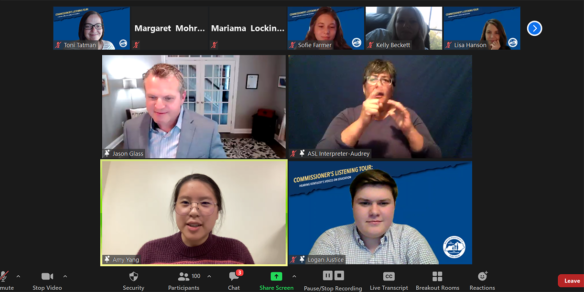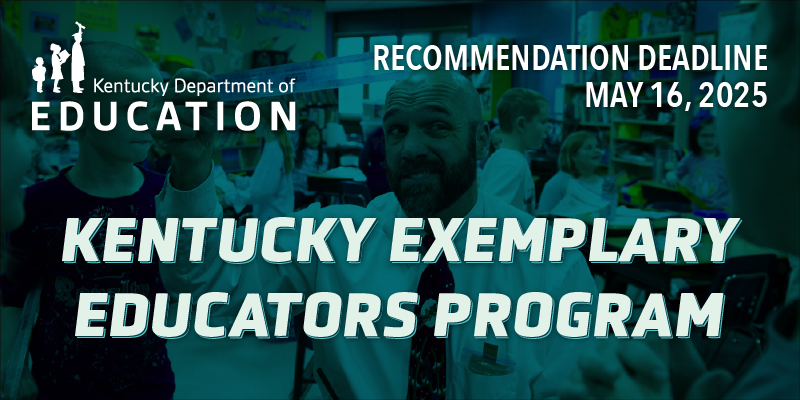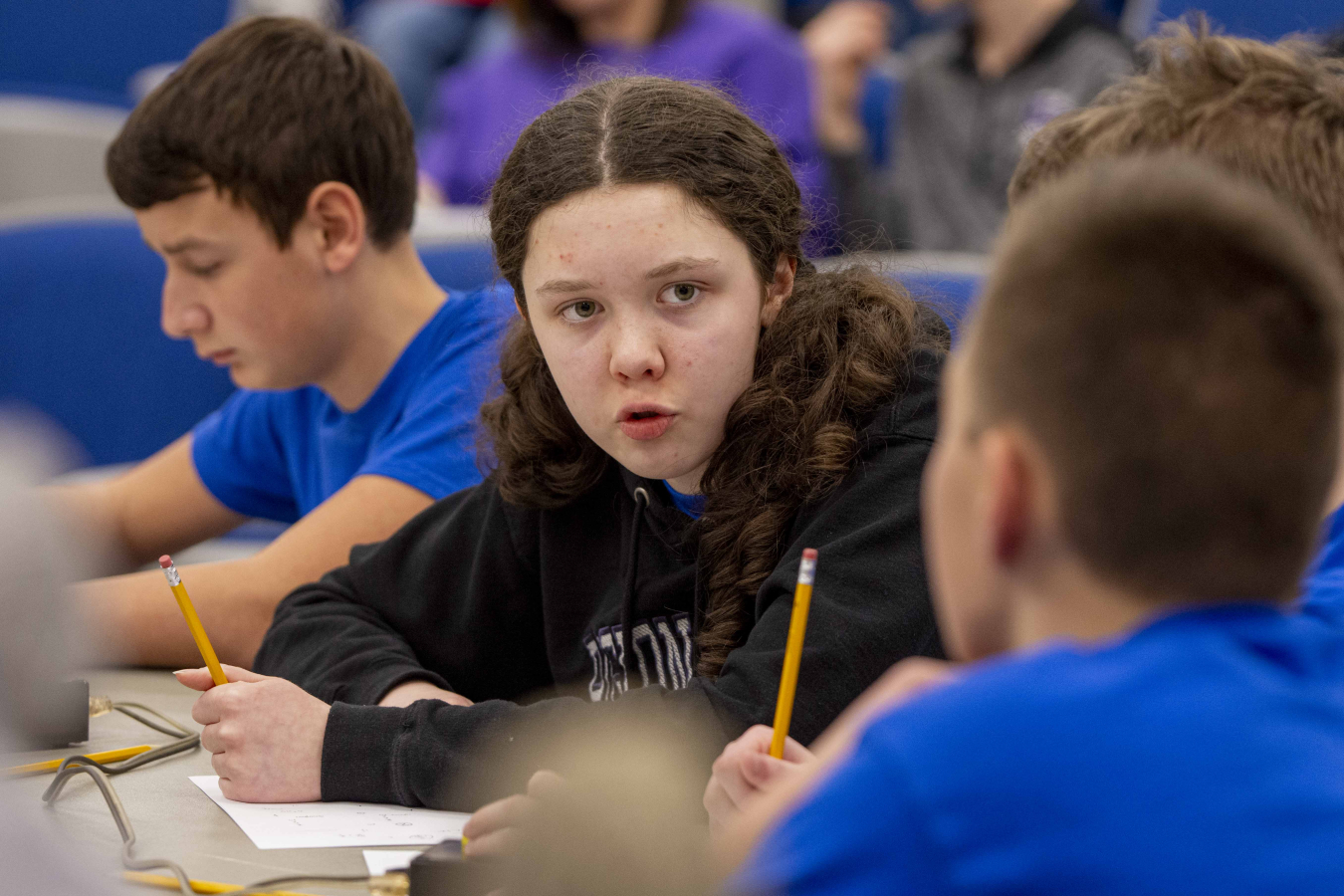
Education Commissioner Jason E. Glass, top left, listens to Kentucky students Amy Yang, bottom left, a senior at the Craft Academy, and Logan Justice, bottom right, a junior at Paul Laurence Dunbar High School (Fayette County) during the April 22 stop on the virtual Commissioner’s Listening Tour. Both Yang and Justice serve on the Commissioner’s Student Advisory Council and have served as facilitators leading discussions during the town halls.
Photo by Toni Konz Tatman, April 22, 2021
- One aspect of the virtual tour has been consistent – the presence of student voice.
- Because of the response the tour has received, Glass said he plans to involve the voices of Kentuckians in solving future issues or challenges the education community may face.
By Jacob Perkins
Jacob.perkins@education.ky.gov
The beginning of learning anything meaningful starts with curiosity, Education Commissioner Jason E. Glass explained at the beginning of each stop on his virtual Commissioner’s Listening Tour.
“When it comes to redesigning our education system, our attention should focus first on igniting curiosity in a meaningful and authentic way,” he said.
As the virtual tour nears an end, the feedback and input received from Kentuckians across the state will shape the future of public education in the Commonwealth.
For those who have not been able to join, there are two more chances, with one of those being a session in Spanish to reach more students and families. Visit the Commissioner’s Virtual Listening Tour webpage to register for one of the remaining dates. Registration is required to participate in sessions.
So far, Glass and staff from the Kentucky Department of Education (KDE), the University of Kentucky College of Education, Kentucky’s education cooperatives, and volunteer students and teachers from across the state have heard the voices of nearly 1,000 stakeholders.
“We want to hear from Kentuckians of all kinds,” Glass said. “I think we have been successful in getting a broad representation of the state to participate and share their perspectives.”
Glass’ goal is for the tour is to center on the experiences and stories of the state’s education community – called empathy interviewing – rather than focusing on policy-related issues. Using these experiences, KDE will develop a future vision for what school should be for everyone, Glass said.
While the experiences shared have varied from stop to stop, one aspect of the virtual tour has been consistent – the presence of student voice. A Kentucky student has facilitated every breakout room during the tour because Glass believes the future of education in the Commonwealth needs to be built on the voice of students and educators.
“For decades we’ve made decisions for our schools that have been made in committee rooms, legislative chambers and Congress, far away from classrooms and from students,” Glass said. “That’s something that I really want to be different with this effort.”
Wallace Caleb Bates, a senior from Breathitt County High School, has participated in several of the virtual town halls and said he has enjoyed being an integral part of this important initiative.
“I’ve enjoyed participating as a facilitator during many listening tour events,” he said. “The opportunity to connect with, engage and gather input from education stakeholders – including students, teachers, parents and community members from across the Commonwealth – is one I am glad to have. I am grateful for Commissioner Glass and KDE staff as they continue to place great emphasis and value on the ideas, opinions and voices of Kentucky’s people.”
Once in breakout rooms, the public has discussed several topics, including their experiences with learning and what they believe makes great teachers.
According to Glass, most of the tour participants report positive experiences with specific teachers. Many of the stories center on teachers building relationships with their students and showing that they genuinely care for them.
In terms of experiences with learning, Glass said the public has provided a variety of answers. Some of the more common themes have been the importance of providing meaningful instruction, providing motivation and support to students, and showing why learning certain content is necessary and how it can serve a purpose in students’ lives.
While some stories about learning occurred within the school environment, many did not, which reinforces the concept that learning is a lifelong activity, Glass said.
“One of the things that we need to build into our education system going forward is making sure that our students understand that learning is something you’ll do your whole life,” he said.
The conversations have allowed for stakeholders to not only share positive experiences, but also raise concerns about the state’s current education system. Many of the recurring issues that came up during the tour have surrounded funding to public education, equitable access for all students and perceived attacks on the teaching profession.
“These are all things that we need to go to work on right away,” Glass said. “We need to improve funding for education in Kentucky and we need to address the inequities in our system. We also need to stop denigrating the teaching profession, and instead start honoring and lifting up the teaching profession.”
Next Steps
Once the tour is completed, the Center for Innovation in Education (C!E) will form a working coalition to help KDE find themes in the input received during the tour.
The coalition will meet five times throughout June and July with department staff and members of the C!E team to create a document that captures the strengths and needs of Kentucky’s public education system and an aspirational vision for the students of the Commonwealth.
“From this work, we will build a future vision of education that is based on positive and meaningful experiences and think about how we can create more of those,” Glass said.
In addition, C!E will offer training for those who are interested in learning how to conduct an empathy interview and interviewing one or more students, families or educators from their community who weren’t able to register for a tour date.
The training, scheduled for May 12 at 4 p.m. ET, will be an hour-long virtual call and it will take about an hour to interview someone.
Those interested in applying for the statewide coalition and/or conducting empathy interviews may register using this empathy interview training and coalition sign-up sheet.
Using the themes developed from the tour, the coalition and the experiences provided during the empathy interviews, KDE will work to develop a report that will be available to the public.
Glass expressed his gratitude for the time and effort invested by everyone involved with the tour and for everyone who has participated. After the response the tour has received, Glass said he plans to involve the voices of Kentuckians in helping solve future issues or challenges the education community may face.
“It gets back to really engaging, involving and hearing directly from our stakeholders in the state and taking action based on what they say,” he said. “This is an approach I wanted to add to the Kentucky Department of Education. People can expect that this is how we intend to do business.”




Leave A Comment